
For Omar Larrosa, an Argentine forward who got on the pitch in the 1978 World Cup final, a complicated question has a simple response. He is asked whether his winner’s medal is sullied by how the country’s brutal ruling junta exploited that victory. He is, however, one of the few to discuss it.
“Nobody knew anything,” Larrosa tells The Independent. “We played for the people, for the Argentine shirt.
“If the World Cup is authorised by Fifa, with all the federations playing, I had to do my work. My work is football. It’s like a doctor or journalist. You do your work. Fifa ordered this World Cup, so we played.
“It was what I dedicated my life to. It was the best, because I was in the middle of the pitch, hearing the entire public support us, so many blue and white flags. The best, the best that football gave me, to be champion, and lift the trophy.”
Larrosa nevertheless concedes that isn’t a universal view among Argentina’s 1978 squad. Many still refuse to talk about it. Some reject it.
“I believe everyone has their own view,” Larrosa says.
That is because, within view of the Estadio Monumental pitch that Larrosa talks of, there was the Navy Mechanical School that was at that point being used as a torture prison by Jorge Videla’s regime. Of the 5,000 prisoners held there between 1976 and 1983, only 150 survived. Many were raped, castrated, and set upon with dogs and electric batons. All of this continued during the World Cup, when the prisoners could often hear the roar of the crowd at the Monumental 500 metres away. They were known as “the disappeared”, and it did mean that football couldn’t completely insulate itself from the brutal reality of the host regime.
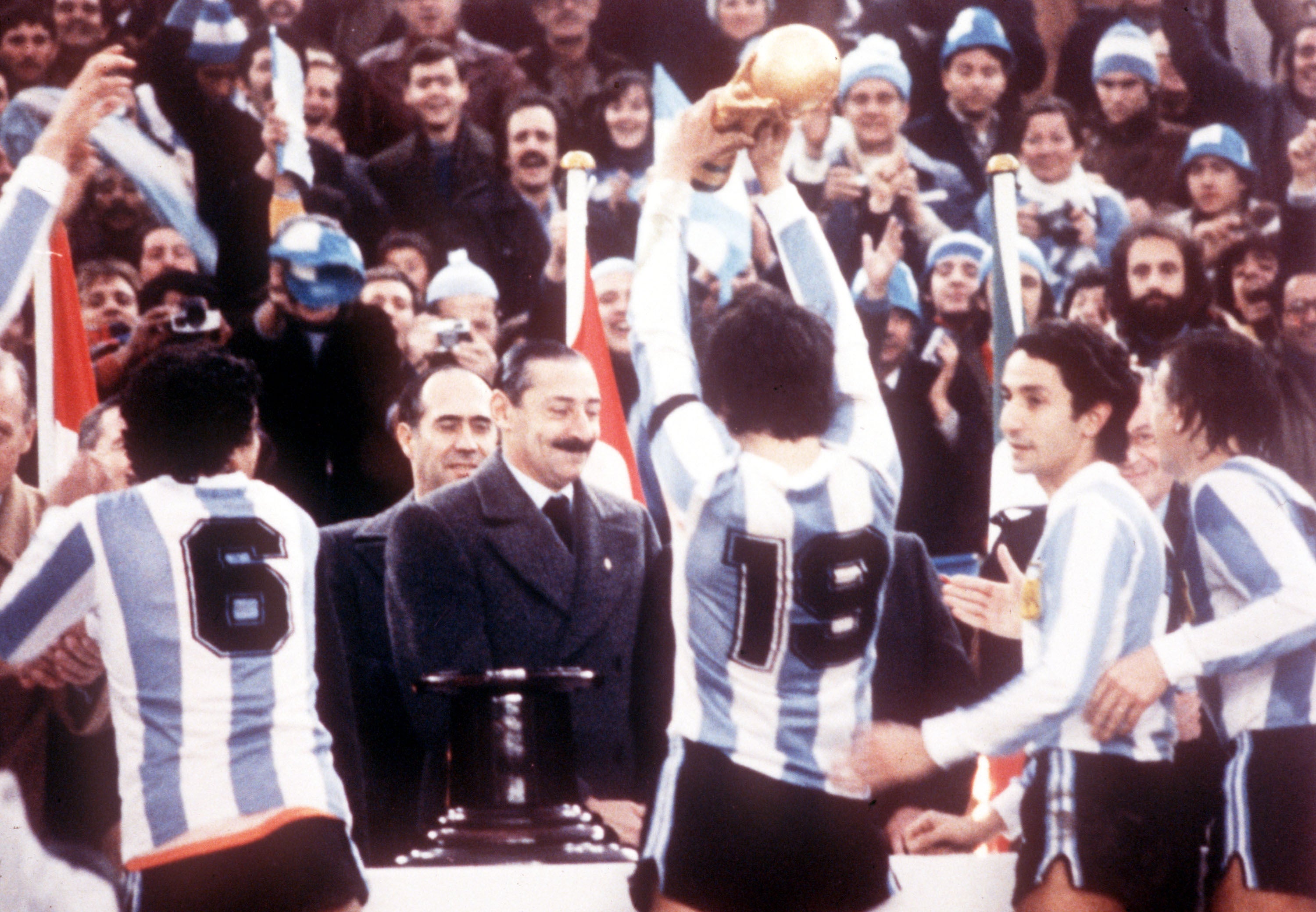
Every Thursday, the mothers of the disappeared would come together at Plaza de Mayo to remind the country of their missing children. A handful of players did go to pay their respects, among them Sweden’s Ralph Edstrom.
“We just went to give our support,” he tells The Independent. “Seven or eight of us went, some Belgian and Dutch players too.
“I remember the sound, the calls. ‘We just want to know where our children are? Dead or alive?’ They begged the international press to help them.
“There were a lot of protests that we shouldn’t go to that World Cup, as there was a Swedish-Argentine woman, Dagmar Hamelin, that was disappeared.”
There was certainly much more of a boycott campaign than now. Paul Breitner, a scorer for West Germany in their 1974 World Cup final victory over the Netherlands, famously refused to play. Both Germany’s Sepp Maier and Italy’s Paolo Rossi signed an Amnesty International petition. Most players, however, pleaded ignorance. All just wanted their chance to play at a World Cup.
The parallels with 2022 are clear, and instructive.
While every World Cup has a deeper political dimension than almost anything else in sport, there have been three tournaments that were on a different scale. They were Italy 1934, Argentina 1978 and Russia 2018. None took place in a political system even resembling a liberal democracy, leaving them subject to exploitation, propaganda and moral compromise.
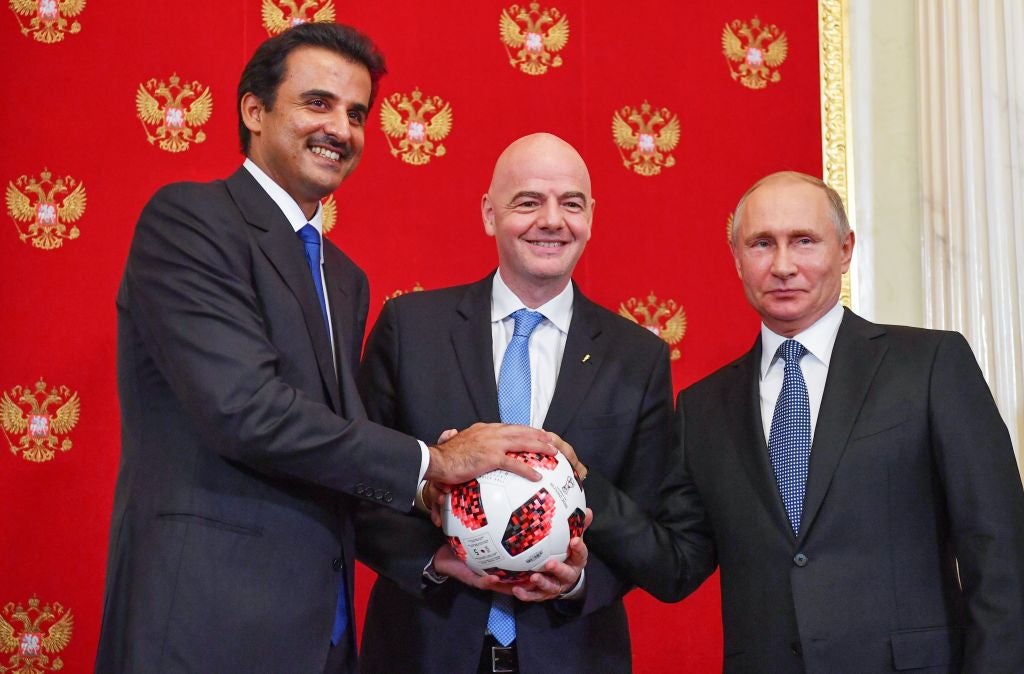
What is relevant as regards Qatar – this fourth overly political World Cup – is how visible all this was; how the competitions were used; how the players felt; how they coped and how much any achievement was sullied.
It’s fair to say the first of them, 1934, happened in a different world. There was no Amnesty International. There was no Universal Declaration of Human Rights. There hadn’t yet been a 1936 Olympics, hosted in Nazi Germany. It is why Benito Mussolini’s World Cup also opened football to a new world, and can almost claim to be the first of these types of sportswashing events. It was why the depth of political pageantry was much more overt, to the point it could almost be called pantomime if the reality wasn’t so serious.
Mussolini had long realised the emotional and propaganda power of football and the World Cup, and how it also fitted with his classically fascist ideal of the Italian man as athletically virile. The country had lobbied hard to beat Sweden in the bidding process, which was fired by suspicion of intimidation and illegal payment. There were echoes of the future and the past. This was vintage bread and circuses, as made so clear with Mussolini’s bombastic claims about a “new Roman empire”. The World Cup was one side of a nationalist mobilisation, the sporting equivalent of the invasions of Libya and Abyssinia. Illustrating its importance, Mussolini’s chief propagandist, Achille Starace, was to coordinate the competition. Starace had created the fascist salute and was the high priest of the cult of Il Duce. He ensured that Italy was immersed in regime propaganda for the tournament.
The new Stadio Olimpico Grande Torino was renamed Stadio Benito Mussolini, one of the most exquisite of the many gleaming new sporting facilities. Around a million posters, stamps, pennants, badges and key rings were distributed.
It wasn’t just about the Italian people, but the people of the world. Mussolini wanted to show fascism was the future. Foreign supporters were offered subsidies and discounts on travel. In a grand show of choreography to illustrate how well-run all of this was, the eight opening games all kicked off at the same time. Mussolini even had a special trophy sculpted, six times bigger than the World Cup itself. This was the Coppa del Duce, which featured footballers in front of fasces, the wooden rods that became a symbol of fascism.
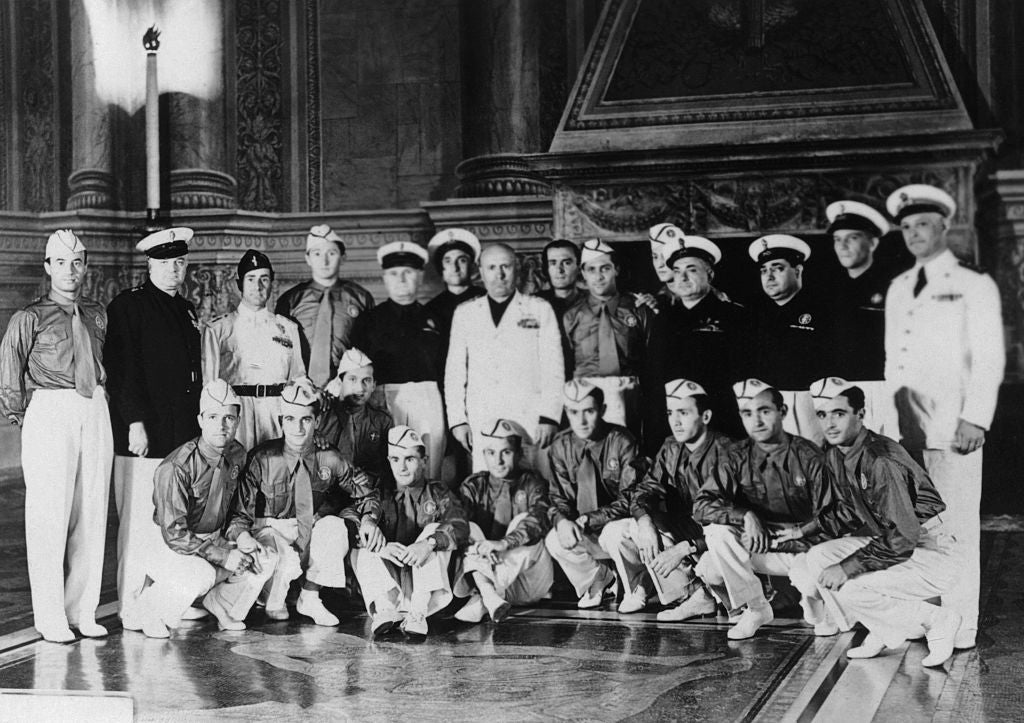
This show of organisational power had to lead to something sensational: nothing less than Italian victory. Mussolini is reported to have at one point told manager Vittorio Pozzo, in front of the squad, “God help him if he fails”.
These power moves were accompanied by displays of the common touch. Mussolini took his sons to the opening game against the USA and then ostentatiously paid for his own tickets.
While the dictator went to almost every host match, usually in his yachting cap, the population was not so eager for the tournament in general. Many matches had swathes of empty seats, but radio broadcasts would still talk of how packed they were.
It was just as well the Italian team was one of the finest of the age, led by the legendary Giuseppe Meazza, but they may not have been without help. Mussolini was effectively selecting referees, most notably Ivan Eklind for the final. The Swedish official had been accused of overlooking Italian aggression in the semi-final against Austria. It meant that gestures of admiration towards Mussolini from visiting squads gave way to complaints, with Austria’s Josef Bican describing Italy as “little cheats”. It was later reported in Czechoslovakia that Eklind and Mussolini had dinner together the night before the final. Emotions were high.
Czechoslovakia, who had beaten Germany to qualify for the final, would enrage Mussolini on the day of the final by officially confirming an alliance with the Soviet Union. The great showpiece consequently came to be seen as a grand sporting showdown between communism and fascism. Victory was essential.
Pozzo was told as much. The occasion had a suitably epic scale.
This time, the 55,000-capacity Stadio Nazionale del Partito Nazionale Fascista had a 65,000-strong crowd, Mussolini emerged in a white suit to give the fascist salute as the crowd sang “Duce, Duce”. Numerous banners declared “Mussolini is Always Right”.
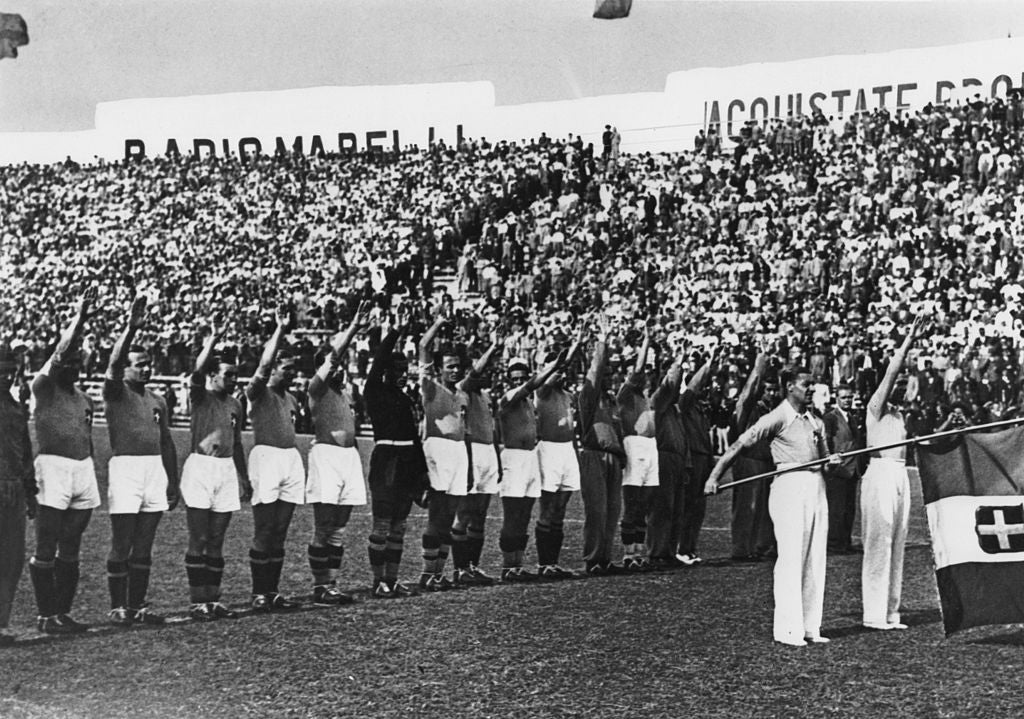
The excellent book Death or Glory: The Dark History of the World Cup by Jon Spurling gives a first-hand insight into the feeling on the day, as former young fascist Giovanni Meifredi is interviewed.
“It was a beautiful day,” he tells Spurling. “There were so many young boys walking towards the ground in black shirts, and you knew you were walking towards a collective experience. We practically marched in and sang our marching songs on the way into the ground. Inside, the noise was huge – of epic proportions. Surely it was a throwback to the days of gladiators in the Colosseum?”
Italy duly beat Czechoslovakia 2-1 with a late equaliser from Raimundo Orsi and an extra-time winner from Angelo Schiavio. Mussolini declared that the victory “rivalled the achievements of previous emperors of Rome”.
For Meifredi, as he tells Spurling, much of this was down to the dictator himself.
“His name became filth. But I never forgot him, and remember him still, and nothing resounds quite like the team winning the 1934 World Cup.”
Jules Rimet, the then Fifa president, felt that World Cup was similarly intertwined with Mussolini, albeit with a more ambiguous meaning.
“I have the impression that it was not Fifa that really organised the World Cup, but Mussolini,” he said.
Whether the players felt the same is open to debate. Pozzo was authoritarian but not fascist. Meazza was frequently used for propaganda. Right-back Eraldo Monzeglio meanwhile taught Mussolini and his children tennis.
Like Meifredi, they certainly didn’t think the achievement was compromised. This was a simpler world. It was just football. It was the ultimate medal.
The 1978 World Cup could be afforded no such innocence. Amnesty International was openly describing it as “a carbon copy of 1936” in the build-up. Unlike Russia and Qatar, there were direct calls for boycotts. Posters and campaigns abounded.
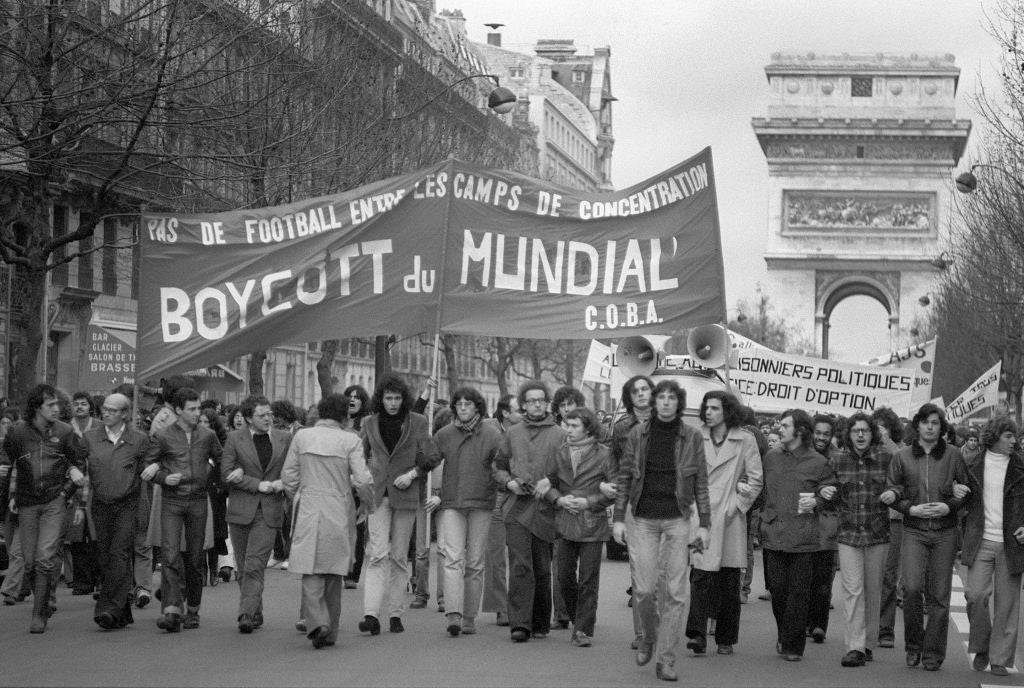
It showed how, if 1934 was the original sportswashing event, this was Fifa’s “original sin”, to quote the compelling new documentary Fifa Uncovered. It was the point at which the federation illustrated they were willing to engage with the most horrific states.
On the eve of the tournament, Fifa’s own autocratic leader, Joao Havelange, came out with words that again echo those of today.
“I’m sure that Argentina will host an excellent World Cup… it has the right conditions, financially speaking, for us to have a perfect World Cup.”
Havelange would later talk, with full sincerity, of how Videla’s military junta ran a tournament where “discipline was absolute”.
Other elements also foreshadow those of 2022. In Rosario, a huge wall was built to hide the shanty towns. Many of the buildings were bulldozed, with inhabitants moved away from host cities.
For the PR campaign, Videla meanwhile hired Burson-Marsteller, the firm that later worked with Romanian communist dictator Nicolae Ceausescu and the American private military company Blackwater. It gave rise to the line “when evil needs public relations, evil has Burson-Marsteller on speed dial”.
Videla watered down some of the militarism for the opening game, wearing just an ordinary suit as he stood near US secretary of state Henry Kissinger. Ther were rumours that another attendee at the games was Nazi war criminal Josef Mengele. Videla meanwhile spoke of a “World Cup of peace”.
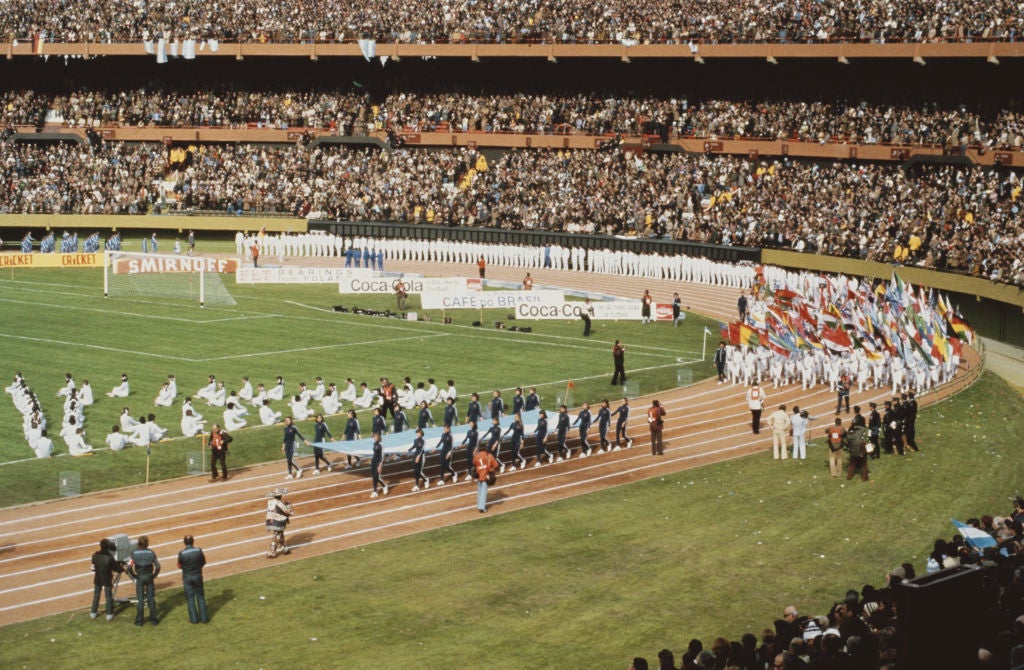
The Argentine press, tightly controlled by the regime, castigated foreign criticism as a “campaign of lies”.
Argentine journalist Ezequiel Fernandez Moores reported that the Dutch government gave the junta millions of dollars in credits through ABN bank and sold them weapons. German companies like Mercedes and Siemens would meanwhile have lost immense income in the event of a boycott. Both countries saw a lot of internal calls for a boycott, to the point that the Dutch midfielder Wim van Hanegam told one humanitarian to stop calling him.
Some players, such as Maier and Rossi took stands. The Netherlands’ Johnny Rep otherwise summed up the general mood to Spurling.
“Many players were aware of what was happening in Argentina but in the end I suppose the lure of the World Cup was simply too strong.”
If the other qualified counties could not plead ignorance, all of this at least gives Argentine players some plausible deniability about how much was known, even as 29 people disappeared during the four-week tournament.
“We didn’t know anything,” Larossa says. “A few might have. We were confined to the camp for over a month, and there were only the newspapers and a few TV stations, but it was the minimum.” Ricky Villa, who moved to Tottenham after the World Cup, later said he would not have played if he knew what was going on.
Edstrom paints a more blurred picture.
“When we had our training sessions, there was no tourism, but a lot of military visibility. I know our head coach, when we came back to Sweden, he said on television, ‘We didn’t see anything, it was a very nice country’. For me, that was unbelievable. We saw a lot of military. I spoke with the Argentine people. ‘You must be happy in Sweden,’ they told me. ‘We have so many disasters. Take care when you go back to Sweden because you have a free country.’”
Defender Alberto Tarantini has said that, before the World Cup, he directly went to the authorities to ask about two of his friends who had disappeared.
One of the most notorious games of the tournament was Argentina’s 6-0 win over Peru, which secured the hosts’ place in the final against the odds. Debate has persisted over whether the game was fixed, but the influence of the junta is undeniable in other areas around the fixture.
Some Peruvians later claimed that Videla went into their dressing room with his security guards before the game. “Remember who your Latin brothers are,” the dictator is claimed to have said. “We stick together, don’t we?”
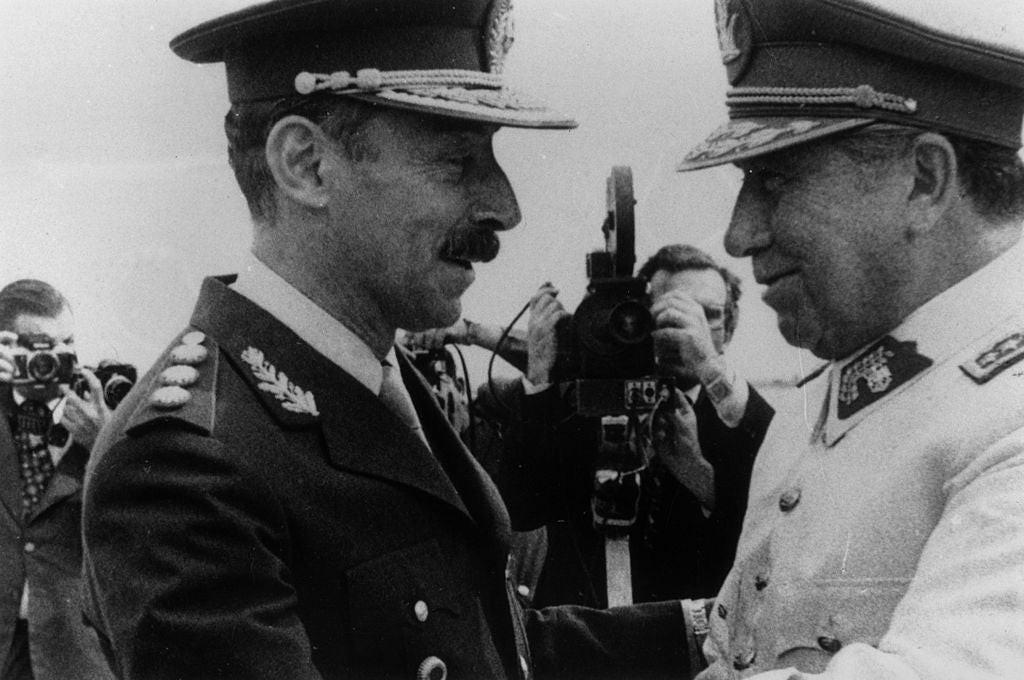
During the game then, supposedly at the same moment the fourth goal was scored, a bomb exploded at the home of treasury secretary Juan Alemann. He had questioned the cost of the tournament.
Amid all of this, and the junta’s desperate desire to win the World Cup, the Argentine squad rationalised the use of their campaign with one common line. It was, in the words of Larrosa and almost everyone else, “for the people”.
“We played for us, for no government, you never play for any government, neither did the lads of 1986. You play for the shirt and the flag.”
Charismatic manager Luis Menotti, himself a leftist, uttered the same sentiments in his speech before the final against the Netherlands. He declared that football was the only thing that was legitimate in Argentina.
In the moment of victory, then, many players made sure they were not seen near Videla. Even though the regime clearly accrued political capital from the victory, a weapon to further subjugate the people, millions of those people were rapturous. It is estimated that more than half of Buenos Aires’ population ran out to the streets in celebration.
“They were the first happy moments I remember as a community,” football executive Daniel Ferreiro says in Fifa Uncovered. It is claimed that political prisoners celebrated, with the brutal guards doing the same thing alongside them. It led Claudio Tamburrini, a lower-league goalkeeper who was also a philosophy student and wrongly imprisoned as a political activist, to remark.
“What is the fascination of sport that makes it possible for torturers and tortured to embrace each other after the goals scored by the national team?”
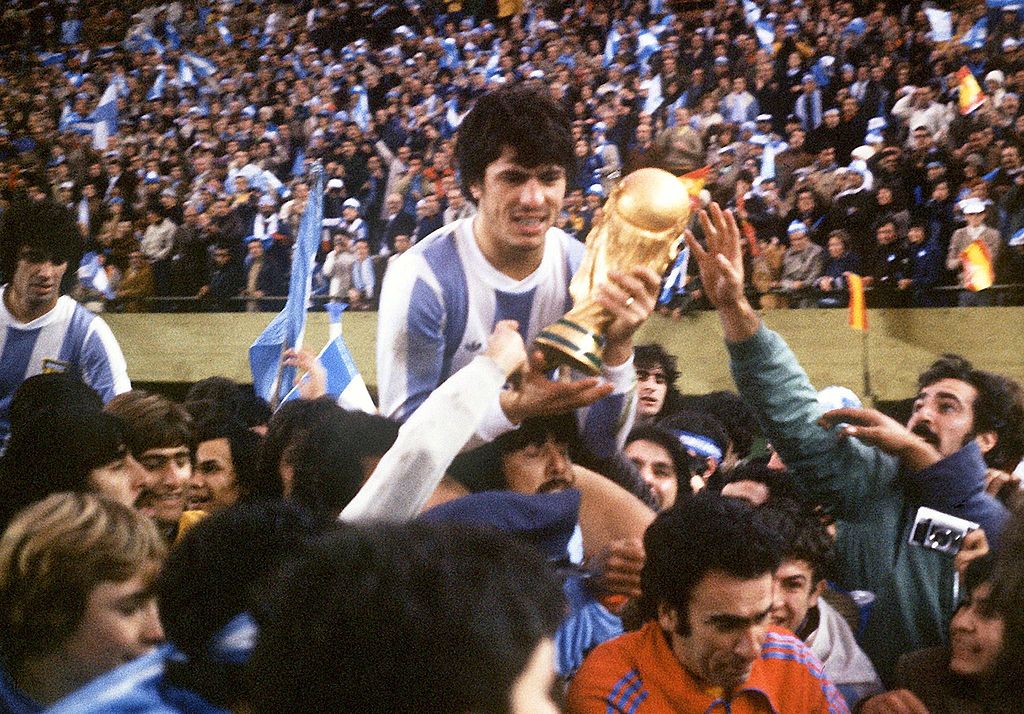
Many of the players nevertheless came to express regret that they had been “used as puppets”. The reality hit home for Villa when mothers of the disappeared asked why he didn’t speak out during the World Cup.
“When the time passed and democracy arrived, we began to know everything that had happened,” goalkeeper Ubaldo Fillol said. “I am very embarrassed because I realise that ... the glory of becoming world champion was used to continue kidnapping, torturing and killing people. I am ashamed to say that I was happy because I was world champion.”
Fillol, however, gave a slightly different opinion in another interview.
“To many people, the World Cup in 1978 means 30,000 disappeared. But none of us tortured or killed anyone. We just helped our country to have a bit of joy and we defended the Argentinian colours with bravery. I cannot be ashamed of that.”
Elsewhere, ex-Netherlands player Ernie Brandts has said on Argentine TV he would not have travelled to the tournament had he known the full reality.
Given the horrors in Italy and Argentina, it is all the more remarkable that football has made similar mistakes with Russia and Qatar.
It could at least be argued that the events of 2 December 2010, when both countries won their bids, foreshadowed a coming political climate that football’s institutions have been unequipped to deal with. They didn’t know how to handle these states using the game and a more sophisticated form of sportswashing.
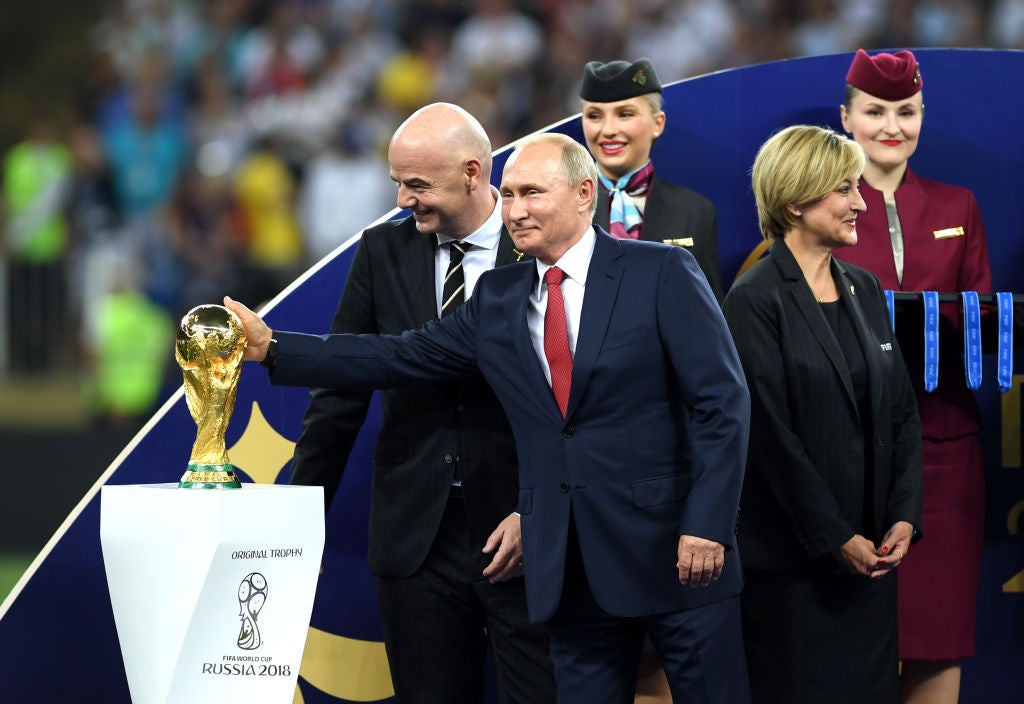
Since the invasion of Ukraine, it does now seem that Russia 2018 was something of a Potemkin village, and some sense of guilt can be divined from how it was viewed. It was, in the words of so many in the game, “a modern 1936 Olympics”. And yet there was still the 2014 invasion of Crimea, still the suppression of democracy and so many human rights.
At the same time, and all the more importantly given the current climate, the 2018 World Cup served to showcase how Russia’s culture and people were separate from the state. Much of the joy was pure in that sense. It was just used, as has previously been the case over the history of the World Cup.
It raises difficult questions. Should the French players see their 2018 gold medals as sullied? Is England’s long-awaited semi-final appearance morally lessened?
None of the players see it that way. None of them will see a winner’s medal in Qatar as compromised.
Many players will meet with migrant workers during this World Cup. These meetings will be more choreographed than when those handful of players visited the mothers of the disappeared in 1978.
“I hope there are some protests from the teams there,” Edstrom says.
Larrosa finishes with another simple statement.
“It’s for the people, for us, for our family,” Larrosa says. “It’s for many things, for many reasons.”
That is what makes the World Cup so politically potent.







